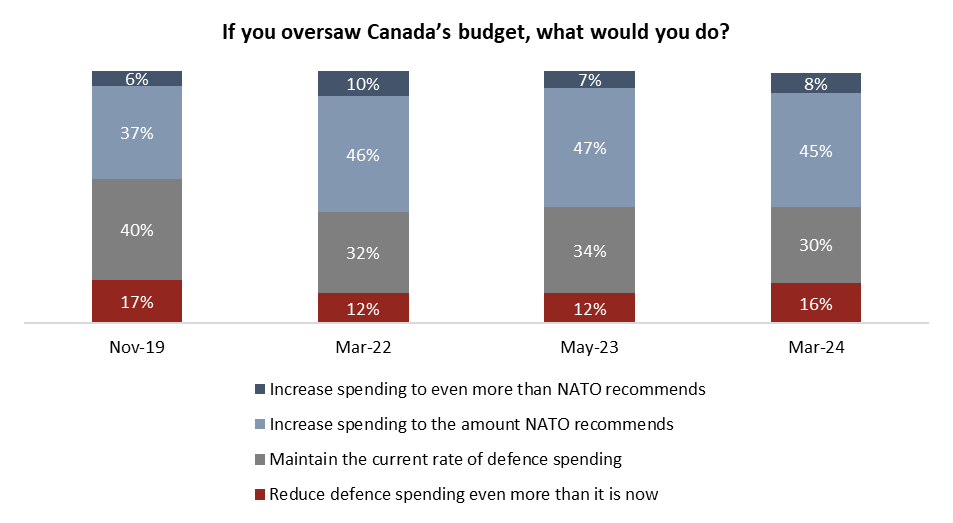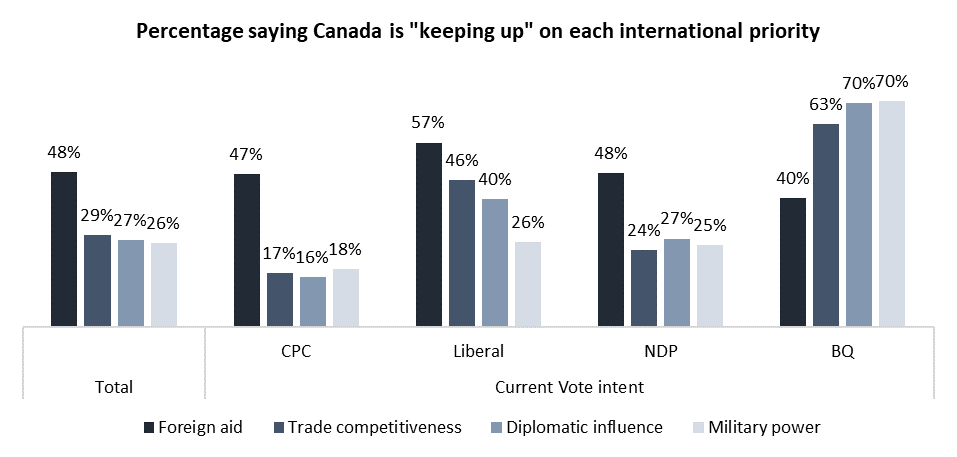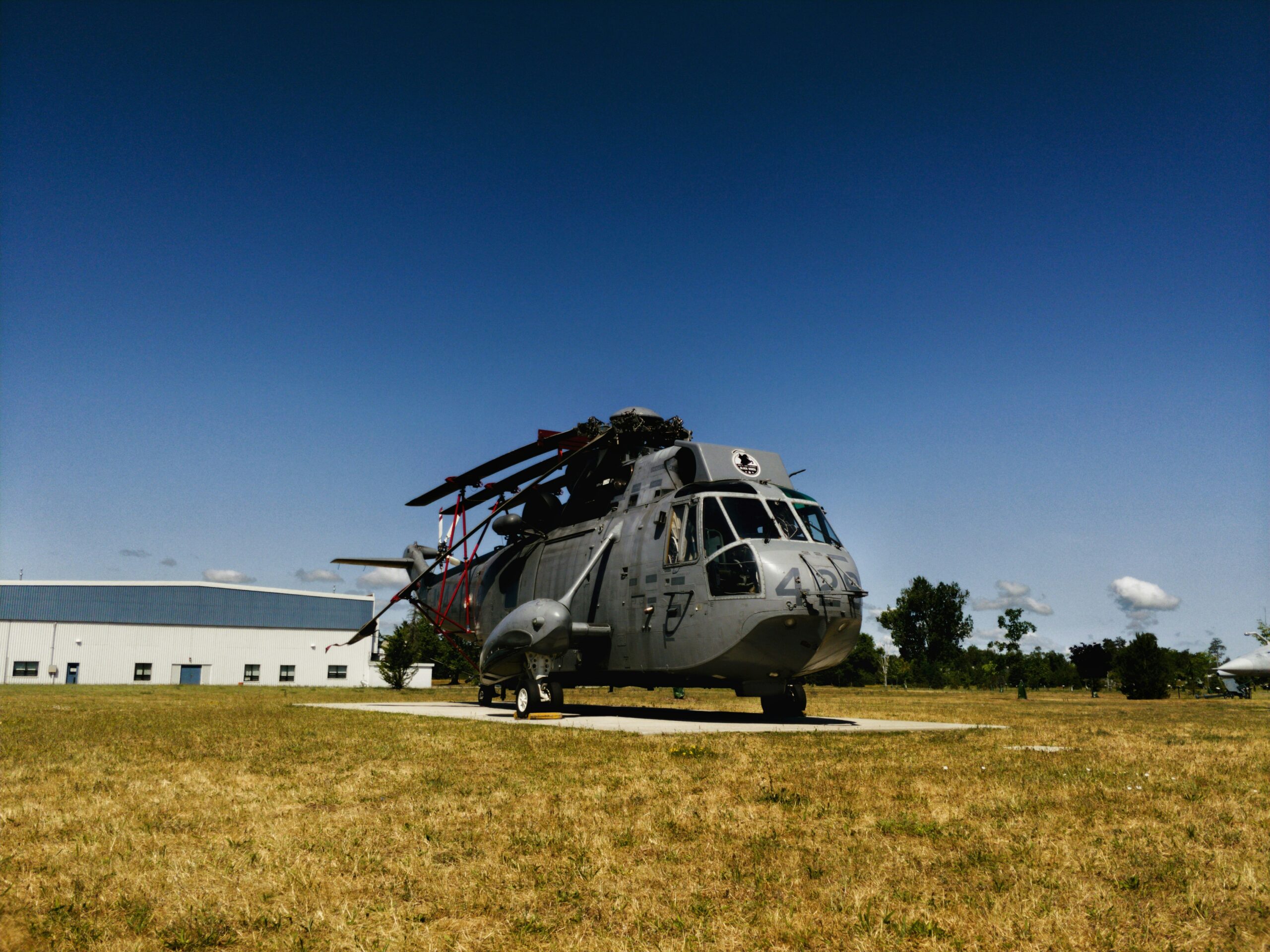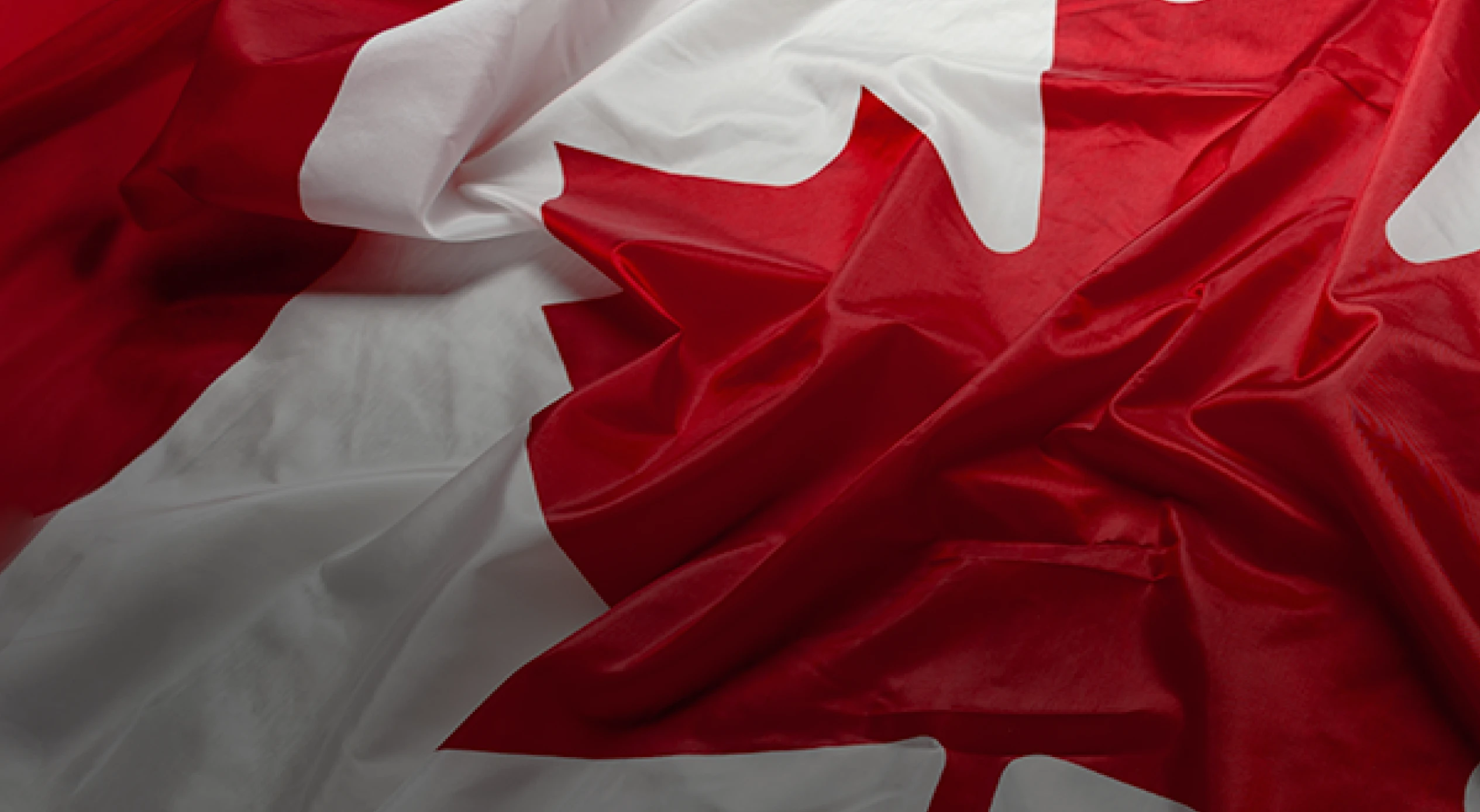March 5, 2024 – Prime Minister Justin Trudeau has been on the defensive over Canada’s defence spending in the days after a trip to Ukraine and Poland. This is not the first time that some have criticized Canada for committing to, but not meeting, the two per cent of GDP spending target for NATO members. The war between Russia and Ukraine has only brightened the spotlight.
Back at home, Trudeau now faces a public with a growing desire to see the government to invest in military preparedness.
New data from the non-profit Angus Reid Institute finds the proportion of Canadians choosing their nation’s military preparedness and presence on the world stage as a top priority rising from 12 per cent to 29 per cent in the past decade. This, as the most-chosen priority – building better trade ties with international partners – has dropped from 57 to 43 per cent.
Slightly more than half say Canada should increase its spending level to two percent or beyond (53%), while 30 per cent would maintain the current spending amount (1.38% of GDP) and 16 per cent would reduce spending even further. Perhaps most notably, seven-in-10 of those who say they would support the leading Conservatives would spend to or beyond the two per cent recommendation. As such, two major factors may influence Canada’s defence spending future: which government is in power in both Canada and the United States.
No Canadian government has hit the two per cent mark in defence spending since 1990, and indeed, spending under Trudeau has increased after dropping to its lowest point in modern history under the previous Conservative government led by Stephen Harper. Despite this, Conservative leader Pierre Poilievre has said his potential government would work towards the NATO target, partially by cutting foreign aid. Meanwhile, a potential return of former president Donald Trump might increase the pressure on either a Conservative or Liberal government to pony up.
Trump recently threatened that if re-elected his government would not defend underspending NATO allies from Russian aggression. Overall, support for spending two per cent of GDP on defence rises from 53 to 65 per cent when Trump’s hypothetical is considered. This includes a two-fold increase among women between the ages of 18 and 34, from 22 to 47 per cent, and double-digit jumps among most age and gender groups.
More Key Findings:
-At least half of Canadians say that Canada is “falling behind” with respect to its military power (58%), diplomatic influence (57%), and trade competitiveness (50%). One area where Canadians largely feel Canada is “keeping up” is in foreign aid (48%).
-Among current CPC supporters, equal numbers say Canada’s focus should be on improving trade ties (48%) and military preparedness (46%), while few care to focus on foreign aid (6%). Those who support the Liberals are divided equally between prioritizing aid (38%) versus trade (38%), while would-be NDP voters lean toward improving foreign aid delivery (48%).
Part One: Division over NATO spending
The pressure is building on Canada to follow through on a promise made to its NATO allies last summer to spend at least two per cent of its GDP on defence. The U.S. ambassador to NATO pointed out Canada is the only NATO member country that currently does not have a plan to reach the two per cent target, saying that the country “lacks the commitment” NATO allies want to see.
Currently, Canada spends about 1.38 per cent of its GDP on defence, in 25th place out of the 30 NATO countries. Defence spending under the Liberal government of Prime Minister Justin Trudeau has, however, increased compared to the previous Conservative government of Stephen Harper, on whose watch Canadian defence spending declined to its lowest levels in modern history. The last time Canada spent two per cent on defence was 1990:

Former U.S. President Donald Trump ratcheted up the pressure further when he said he would “not protect” NATO members who fell short of the two per cent spending target while stumping for his re-election campaign. He even said he would encourage Russia to “do whatever the hell they want” to countries who underspend the target.
Canadians’ opinions on their country’s defence spending have remained consistent in the past two years in the wake of Russia’s 2022 invasion of Ukraine. Half (53%) would increase spending to NATO’s target or more. Three-in-ten (30%) would hold steady while one-in-six (16%) would reduce defence spending.

Seven-in-10 current CPC supporters would spend 2% or more
The Russia’s invasion of Ukraine in 2022, and the conflict’s proximity to the borders of NATO allies, has increased the focus on defence and military budgets within the alliance. A majority (60%) of Canadians said in January that NATO’s support of Ukraine “is the only thing keeping Russia from invading more of Europe.” However, support of the conflict is waning – most markedly among past Conservative voters.
Related: Ukraine Invasion: Canadian attention, and Conservative support, plummets two years into conflict
Conservative supporters’ reduced interest in supporting Ukraine does not appear to indicate a reduced appetite for military spending in general, however. Seven-in-ten (71%) past CPC voters would increase Canada’s defence spending, including the 15 per cent who would exceed NATO’s two per cent target:

Conservative voters have historically been more enthusiastic about increasing defence spending than other political groups. Prior to Russia’s invasion of Ukraine in 2022, past Liberal and NDP voters were much more likely to want Canada to maintain or reduce defence spending:

What about Trump’s threat to withhold defence from under-contributors?
Trump’s campaign comments about withholding U.S. military assistance for NATO spending laggards sent ripples throughout the alliance. They also apparently influence Canadians’ thinking on the subject.
Canadians who would maintain or reduce spending on defence were asked a follow-up question to see if Trump’s comments affected their opinions on the matter. Three-quarters say no, they would still spend less than two per cent of Canada’s GDP on defence, but one-quarter say they would meet the NATO target in the face of Trump’s threat (see detailed tables).
What this leads to is a 12-point increase in the percentage of Canadians that would support an increase in spending, including a 25-point jump among young women:

Part Two: International priorities
Trade still top, but preferred focus on military preparedness more than doubles
When Russia invaded Ukraine in 2022, it brought war right up to the borders of NATO allies. It also heralded a shift in Canadians’ priorities when it comes to what they believe Canada should be focusing on internationally.
Trade is and has been the top selected priority, but the proportion of Canadians who believe their country should focus on military preparedness has more than doubled since the 2015 election, when Trudeau first became prime minister. Simultaneously, the number of Canadians who believe trade should be the first-most focus has declined. Three-in-ten in 2015 and 2024 believe Canada should focus on foreign aid.
Women under 55 prefer Canada focus on aid or trade, while men older than 55 are more likely to prefer Canada focus on military readiness (see detailed tables).

Conservative leader Pierre Poilievre said a government led by him would work towards the NATO two per cent target. To get there, he said he would cut foreign aid spending to boost the military budget. Foreign aid has consistently been a lower priority for Conservative supporters than past Liberal or NDP voters. Instead, past CPC voters have consistently voiced higher levels of support for building trade ties internationally.
While that still remains a high priority for CPC voters (47%), there are now as many who believe Canada should focus on military preparedness (45%). The latter represents a 27-point jump from 2015.
International priorities have shifted towards military matters for past Liberal and NDP voters, but in a much less stark manner:

Part Three: Keeping up or falling behind?
Trudeau famously stated that Canada was “back” in a message to allies after the 2015 election. Nearly nine years in, however, Canadians are worried that the country is falling behind in key areas.
Keeping up on foreign aid, falling behind on diplomatic influence
Canadians offer relative praise to Trudeau and the Liberal government’s foreign policy in one area: foreign aid. Here, likely buoyed by significant support for Ukraine over the past two years, 48 per cent say Canada is keeping up, while 29 per cent say it is falling behind. On other key areas of international relations and obligations, however, Canadians are more critical than they were in 2015. At least half now say Canada is falling behind when it comes to its diplomatic influence, military power, and trade competitiveness:

Across the political spectrum, with the exception of Bloc Québécois voters, Canadians are relatively critical of the government’s performance on these key international priorities.

Those who feel that Canada should increase its defence spending in line with or above the NATO recommendation are also much more likely that others to say that the country is falling behind in its military capacity:

The Angus Reid Institute conducted an online survey from Feb. 28-29, 2024 among a representative randomized sample of 2,427 Canadian adults who are members of Angus Reid Forum. For comparison purposes only, a probability sample of this size would carry a margin of error of +/- 2 percentage points, 19 times out of 20. Discrepancies in or between totals are due to rounding. The survey was self-commissioned and paid for by ARI.
For detailed results by age, gender, region, education, and other demographics, click here.
For detailed results by foreign policy priorities and approach to defence spending, click here.
For a PDF of the full report, including detailed tables and methodology, click here.
To read the questionnaire, click here.
Recommended
Consumer Economic Pulse – CA March 2025
...
Canada-US Relations 360
...
Consumer Economic Pulse – CA February 2025
Economic anxiety grows as recession fears resurface: Pessimism around personal finances has also increased, with 43% feeling pessimistic about their household’s financial future. More Canadians adjusting spending amid financial pressures: With increasing...
Navigating Canada-US Relations
...









